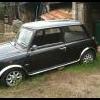No - you don't! The large nuts are done up as tightly as you can with a 4 ft pole on the T bar - and then ON to the next split pin hole. Way beyond the range of most torque wrenches. As for the disc-hub bolts - just be sensible when tightening them
Just buy a bigger one, we have some at work that go up to about 800 lbs/ft after that we just use torque multipliers.
Where possible, a torque wrench should always be used. It doesn't take any extra time that using a normal ratchet and then you know the job has been done correctly with no undue stress to any nuts/threads.
So, are the torque figures quoted for Minis for dry or oiled/wet assembly? The difference can be over 25%. Do these figures apply to new, old or all threads? These figures are meaningless without that basic piece of data. In the Aerospace Industry torque settings are part of a total assembly procedure which includes type of assembly lubricant, or lack of it. Then again, should you torque up, slacken by one full turn and re-torque, or not? This must all be specified and adhered to if torque settings are to have any meaning.
I've always used a torque wrench on dry assembled engine bolts/nuts and on oiled APR bolts/nuts, but almost never on anything else and I've been preparing minis for competition for 49 years with no problems connected with torque settings. It's not rocket science. All you need is one tiny spot of oil or grease on a thread and the torque setting may not be tight enough, which is far worse than just doing them up to what common sense says is correct.























